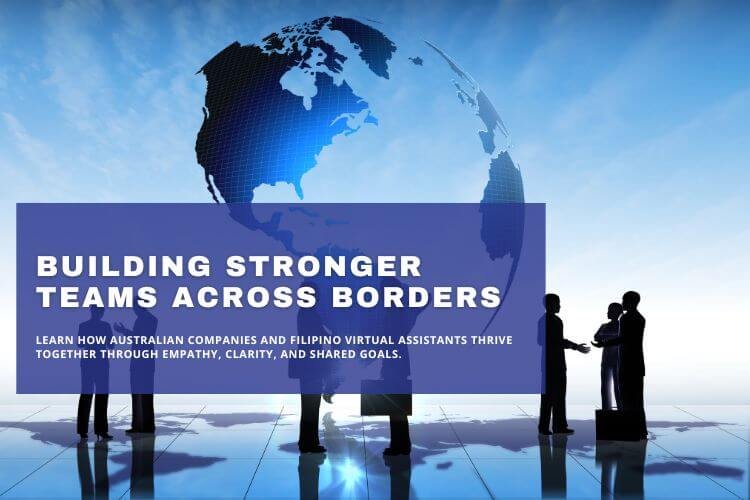Outsourcing between Australia and the Philippines has grown rapidly in recent years, with thousands of Australian businesses now working daily with Filipino professionals. The combination makes perfect sense: Australian companies gain access to skilled, English-speaking talent, while Filipino virtual assistants (VAs) gain meaningful global career opportunities.
Yet, as more teams collaborate across borders, one question stands out:
“What cultural differences should Australian teams understand when working with Filipino virtual assistants?”
The truth is that these differences aren’t barriers — they’re opportunities to build stronger, more balanced teams. When understood and managed well, they create synergy between the Filipino work ethic and Australian management styles, resulting in productivity, respect, and long-term partnership.
In this article, we’ll explore how these two cultures complement each other and how CreaThink Solutions helps businesses bridge cultural gaps for smoother, more effective collaboration.
Understanding Filipino Work Culture
Filipino work culture values respect, teamwork, and adaptability, with a strong emphasis on communication and relationship-building.
The Philippines has a collectivist culture — meaning people place high importance on harmony, family-like relationships, and group success. This mindset often translates into a positive, cooperative work environment where Filipino VAs show loyalty and empathy toward their employers.
Common Traits of Filipino Professionals:
- Respect for authority and collaboration: Filipinos are naturally polite and tend to show deference to supervisors or clients.\
- Politeness and non-confrontational communication: They often avoid direct confrontation, preferring diplomatic approaches.
- Strong sense of community and loyalty: They value long-term relationships and teamwork.
These traits make Filipino virtual assistants reliable and empathetic — they work with care, take ownership of their tasks, and prioritize maintaining harmonious relationships within the team.
Understanding Australian Work Culture
Australians generally prefer open, egalitarian communication and value independence, initiative, and direct feedback.
Australian workplaces are known for their relaxed yet results-oriented environment. Hierarchy is minimal — even senior managers are approachable, and collaboration thrives on transparency and accountability.
Common Traits of Australian Professionals:
- Informal but efficient work style: Australians appreciate a friendly but focused approach.
- Comfort with constructive criticism: They value honesty and directness as signs of trust.
- Emphasis on results over hierarchy: Output matters more than titles or positions.
Australian managers often expect proactive communication, self-management, and the ability to problem-solve without constant supervision — traits that many Filipino professionals quickly adapt to when guided with clear expectations.
Key Cultural Differences That Affect Collaboration
Understanding the differences between Filipino and Australian work cultures helps both sides communicate more effectively and avoid misunderstandings.
| Aspect | Filipino Virtual Assistants | Australian Teams |
| Communication Style | Polite and indirect; may soften criticism to maintain harmony | Direct and assertive; value honesty and clarity |
| Decision-Making | Consultative; seek input or approval before acting | Independent; comfortable making quick decisions |
| Feedback Style | Reserved, respectful; may avoid confrontation | Open and straightforward; prefer clear performance discussions |
| Work Relationships | Personal and warm; build emotional connection | Professional and casual; value work-life balance |
Why These Differences Matter
For Australian employers, these differences can sometimes lead to misinterpretation. For instance, when a Filipino VA hesitates to say “no,” it may not indicate agreement — but a sign of respect or a desire to avoid conflict. Conversely, direct
Australian feedback might seem blunt to a Filipino VA who’s used to a more tactful tone.
Recognizing these nuances helps build trust and collaboration. By setting expectations early and creating open communication channels, both sides can leverage their strengths: Australian efficiency and Filipino empathy.
How to Manage Cross-Cultural Collaboration Effectively

Managing remote teams across cultures requires awareness and structure. Here are practical tips for Australian leaders working with Filipino virtual assistants:
- Encourage open communication: Make it clear that constructive feedback is welcome and not personal.
- Clarify expectations: Define roles, timelines, and deliverables in writing to prevent miscommunication.
- Show appreciation: Filipinos value recognition and positive reinforcement — a simple “great job” goes a long way.
- Respect cultural holidays and personal commitments: Demonstrates cultural sensitivity and builds loyalty.
- Promote regular check-ins: Video calls foster connection and allow clarification of complex tasks.
For more guidance, read our Remote Onboarding Checklist and Guide to Time Zone Management in the Philippines.
How CreaThink Solutions Helps Bridge Cultural Differences
CreaThink Solutions has become a trusted outsourcing partner for Australian businesses looking to build strong, cross-cultural teams in the Philippines.
Here’s how CreaThink Solutions ensures cultural alignment and productivity:
- Deep Understanding of Australian Work Culture
CreaThink Solutions’ management team has extensive experience working with Australian clients, understanding their expectations, communication preferences, and management styles. - HR & VA Training Tailored for Cultural Compatibility
Filipino virtual assistants undergo orientation and soft-skills training on workplace communication, time management, and cross-cultural collaboration — helping them adapt to Australian work environments smoothly. - Transparent Hiring and Communication Process
Every candidate is vetted not just for technical ability but also for professionalism, English fluency, and compatibility with the client’s company culture. Regular performance reviews and open reporting ensure accountability and trust.
Through this approach, CreaThink Solutions acts as the bridge between Filipino professionals and Australian organizations — fostering long-term partnerships built on respect, efficiency, and shared goals.
Conclusion
In an interconnected world, cross-cultural collaboration isn’t just a business necessity — it’s a strategic advantage. While cultural differences between Australians and Filipinos exist, they create opportunities for richer communication, innovation, and teamwork.
Australian teams bring clarity, autonomy, and structure; Filipino virtual assistants bring empathy, dedication, and community spirit. Together, they create a dynamic that balances precision with warmth — a true global partnership.
Looking for a Filipino virtual assistant who aligns perfectly with your Australian team? Partner with CreaThink Solutions today and experience the power of cultural synergy in action.
FAQ
What are the main cultural differences between Australians and Filipinos at work?
Australians are typically direct, egalitarian, and results-driven, while Filipinos emphasize respect, teamwork, and diplomacy in communication.
How do Filipino VAs adapt to Australian communication styles?
With guidance and feedback, Filipino VAs quickly learn to adjust to more direct communication while maintaining their polite and collaborative nature.
What challenges and opportunities come with managing hybrid cross-cultural teams?
Challenges include communication gaps and different feedback styles, but opportunities lie in creating diverse, balanced teams that combine efficiency with empathy.
How does CreaThink Solutions support cross-cultural alignment?
CreaThink Solutions trains and supports both clients and virtual assistants in managing expectations, improving communication, and ensuring cultural compatibility for long-term success.







